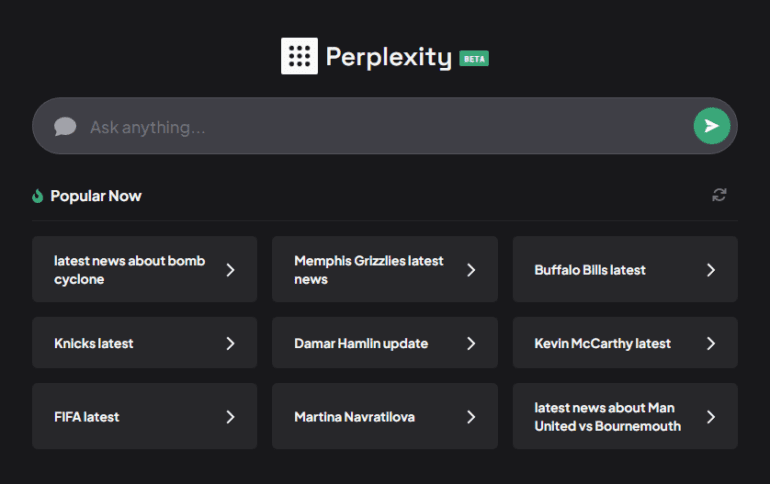TL;DR:
- Perplexity AI, founded by former Google AI researchers, introduces advanced LLMs.
- Their LLMs offer real-time, up-to-date information, surpassing competitors.
- The models are available for integration via Perplexity’s API.
- Perplexity’s unique approach to web indexing ensures freshness and accuracy.
- Human assessments show Perplexity’s LLMs outperforming competitors in current knowledge delivery.
- Accessible through a subscription model, with a $5 monthly credit for users.
- With Google facing challenges, Perplexity emerges as a strong contender in the search market.
Main AI News:
Perplexity AI, a burgeoning startup founded by former Google AI luminaries Andy Konwinski, Aravind Srinivas, Denis Yarats, and Johnny Ho, is gearing up to challenge Google’s supremacy in web search. Their innovative approach combines a robust web index, real-time data, and an intuitive AI chatbot interface, known as Perplexity Copilot. Initially leveraging AI models such as OpenAI’s GPT-4 and Anthropic’s Claude 2, Perplexity Copilot empowered paying subscribers with intelligent insights.
Now, Perplexity AI is taking a bold stride towards becoming the premier search destination by introducing its own AI Large Language Models (LLMs) – pplx-7b-online and pplx-70b-online, named after their colossal parameter counts of 7 billion and 70 billion, respectively. These models are finely tuned and enhanced versions of Mistral and Meta’s open-source mistral-7b and llama2-70b models.
In the realm of AI, parameters denote the intricate connections between artificial neurons within a model. These numbers often signify the model’s power and intelligence, with larger parameters indicating a more knowledgeable, sophisticated, and high-performing system.
Why Perplexity’s Cutting-Edge Online LLMs Are Game-Changers
Perplexity’s new LLMs are a game-changer for several reasons. Beyond being available for integration into other organizations’ applications through Perplexity’s API, they excel in providing “helpful, factual, and up-to-date information.” This sets them apart from most leading LLMs, including OpenAI’s GPT-3.5 and GPT-4 (the foundation of ChatGPT), which often struggle in this regard.
Aravind Srinivas, the CEO of Perplexity, emphasized that the new PPX LLMs are “the first-ever live LLM APIs that are grounded with web search data and have no knowledge cutoff.” In contrast, GPT-3.5 and GPT-4 have knowledge cutoffs, which, until recently, were limited to September 2021 and were only extended earlier this year. This limitation leaves them far from being up-to-date with current events and breaking news, despite the addition of web browsing capabilities through Microsoft’s Bing search.
The Competition for Timely Knowledge
The competition to provide real-time knowledge through LLM chatbots is heating up. Elon Musk’s company, xAI, is boasting about its new chatbot Grok, which promises this capability through direct integration with sibling company X (formerly Twitter). Grok has already entered limited beta testing and will soon be available to all X Premium subscription holders.
Other LLM providers, such as Cohere in Toronto, are also striving to incorporate recent knowledge into their models. They do this by combining web browsing capabilities with retrieval augmented generation (RAG), enabling the model to access external information sources provided by administrators, like company files.
Perplexity’s Unique Approach to Up-to-Date Information
Perplexity’s approach to providing up-to-date information stands out. Their in-house search, indexing, and crawling infrastructure allows them to enrich LLMs with the most relevant and current information. Their vast search index, regularly updated using sophisticated ranking algorithms, ensures that high-quality, non-SEO-optimized websites take precedence. They provide website excerpts, referred to as ‘snippets,’ to their pplx-online models, enabling responses with the latest information.
Outperforming the Competition
To validate the effectiveness of their new LLMs, Perplexity engaged human contractors to assess responses based on criteria such as helpfulness, factuality (accuracy), and freshness (up-to-date information). Contractors compared responses from Perplexity’s PPLX online LLMs, Meta’s Llama 2, and OpenAI’s GPT-3.5 Turbo, selecting their preferred response.
Using Elo scoring, Perplexity extrapolated from these assessments to assert that their models outperformed both OpenAI’s and Meta’s raw models in terms of freshness and factuality. While GPT-3.5 remained superior in terms of helpfulness, Perplexity’s models demonstrated their prowess in delivering accurate and current responses for Perplexity-related use cases.
How to Harness the Power of PPLX Online LLMs
The PPLX online LLMs are now accessible for individuals and organizations through Perplexity’s API website, complete with comprehensive documentation. As an exciting development, Perplexity’s API is transitioning from beta testing to general public availability.
However, this advancement comes with a cost. Despite being built on free, open-source models, Perplexity charges $20 USD per month for its Pro subscription tier, or $200 annually, which includes a $5 monthly credit towards accessing the PPLX models through the Perplexity API.
While the widespread adoption of these models remains to be seen, Perplexity has garnered enthusiastic supporters who believe it represents the future of search. Venture capitalist Jeremiah Owyang of Blitzscaling Ventures, for instance, has publicly endorsed Perplexity, emphasizing that he has no financial ties to the company.
With Google Bard facing challenges and the delayed release of Google’s GPT-killer Gemini, Perplexity is poised to establish itself as an alternative vision for the future of search. In this vision, an AI assistant engages users in conversation and seamlessly retrieves information from the web, eliminating the need for users to sift through search results themselves.
Conclusion:
Perplexity AI’s innovative LLMs, boasting real-time information and superior accuracy, position the company as a formidable challenger to Google’s search dominance. With its unique approach and strong performance, Perplexity is set to disrupt the market, particularly as Google faces challenges and delays in its own AI developments.

